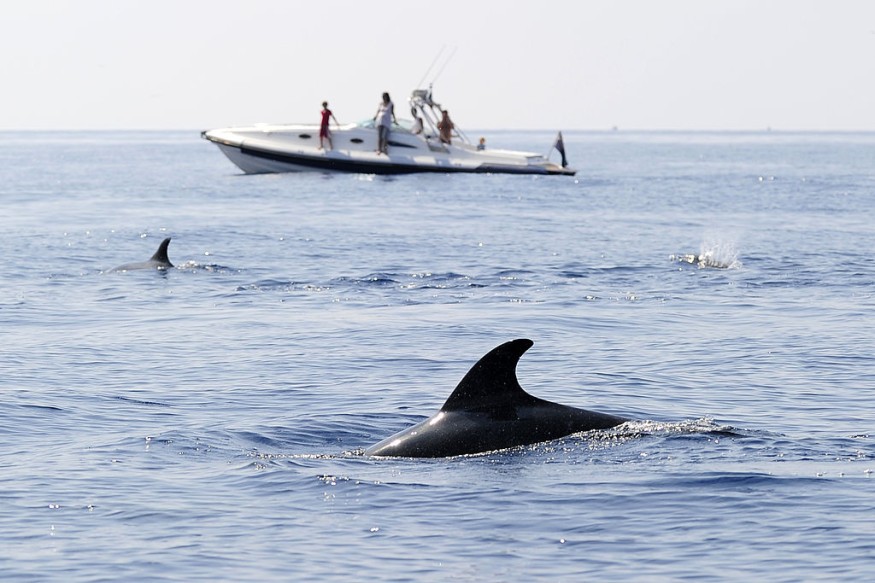The world has been fascinated by the recent incidents of orcas attacking and sinking ships along the Iberian coast, shedding light on the unique behaviors within their culture. However, other marine creatures, including bottlenose dolphins in Moreton Bay near Brisbane in Australia, have also developed the ability to interact with humans.
Researchers from the University of Queensland have discovered that these dolphins appear to be teaching each other to "beg" for food from recreational fishers, a behavior that poses both immediate and long-term risks, Science Alert reported.

Impact of Recreational Fishers Illegally Feeding Dolphins
Between 2017 and 2020, researchers made an intriguing observation as they witnessed dolphins approaching recreational fishing boats in Moreton Bay near Brisbane and feeding on the scraps thrown to them by humans on board.
Léonie Huijser, who was studying dolphin social structures at the University of Queensland, said in a news release that she discovered a specific cluster within the dolphins' social network that consistently patrolled moored boats, eagerly waiting for fishermen to discard bait or catches, despite the activity being illegal.
Huijser noted that this behavior appears to stem from the popularity of fishing in the bay, with some dolphins cleverly exploiting the situation for their benefit.
Although feeding dolphins is prohibited in Moreton Bay, enforcing this regulation becomes challenging when fishing boats are out on the water, far from the reach of authorities. In a neighboring bay, a man was recently fined for feeding dolphins his leftover food, serving as a reminder that penalties for such actions can be significant, potentially reaching up to AU$17,000 (US$11,252).
While the intention behind feeding dolphins may seem harmless, experts emphasize that this activity can have serious repercussions for both individual dolphins and their social groups.
Experts raise concerns about the potential dangers associated with feeding dolphins, as it can lead to detrimental behavioral changes and an increased risk of collisions with boats. Huijser shares that some dolphins who boldly approach boats have exhibited signs of injuries caused by propeller strikes and entanglement in fishing lines.
During her fieldwork near North Stradbroke Island, Huijser encountered a dolphin that surfaced next to their boat but quickly disappeared upon realizing there would be no food provided. The presence of a badly mangled fin on the dolphin indicated a previous entanglement incident, suggesting the detrimental consequences that can arise from human interactions.
Begging Behavior Spreading Among Dolphins
The spread of begging behavior among dolphins is a growing concern for researcher Léonie Huijser. A 2012 paper showed that dolphins possess intricate cultures that can evolve and adapt through social learning, like the orcas.
Huijser worries that non-begging dolphins observing their peers successfully coaxing fish from humans may imitate this behavior, potentially leading to its widespread adoption.
As Science Alert reported, evidence suggests that at least five dolphins in a pod near an island in Moreton Bay have started exhibiting signs of begging behavior, and the presence of a calf within the pod indicates the potential for future generations to learn this trick.
However, Huijser and her supervisor, marine biologist Michael Noad, caution that not all adaptations are beneficial. Begging, while providing short-term advantages in obtaining food, carries long-term risks.
Noad explains in the news release that dolphins could become dependent on handouts of fish, which is akin to consuming junk food for them. Relying on donated fish may lead to issues like food poisoning and nutritional imbalances.
To address this concern, Huijser and the research team at the University of Queensland are actively identifying "hotspots" where begging behavior is prevalent in Moreton Bay, aiming to enhance official surveillance efforts in those areas. The findings from Huijser's thesis have been published on the UQ Library's eSpace platform.
RELATED ARTICLE: Orca Repeatedly Attacked a Yacht Off the Coast of Scotland; First Attack in Northern Waters Raises Concerns of Spreading Trend
Check out more news and information on Animals in Science Times.
© 2026 ScienceTimes.com All rights reserved. Do not reproduce without permission. The window to the world of Science Times.












